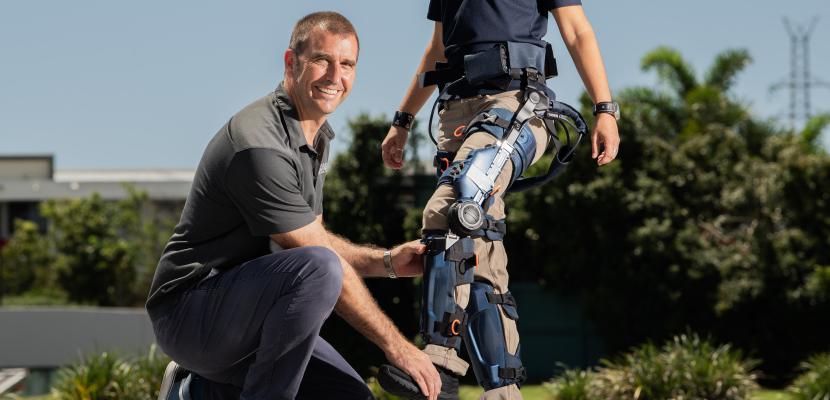
A Bond University research project exploring the integration of exoskeleton technology into the home and community is bringing an exciting rehabilitation reality closer, one step at a time.
The university has partnered with Taiwanese firm Keeogo, the developers of powered exoskeleton technology for those suffering from debilitating conditions such as stroke, osteoarthritis, multiple sclerosis, and Parkinson’s disease and people recovering from surgeries.
Sensors in the exoskeleton allow the inbuilt computer to decide whether to bend or straighten joints and determine how much force is needed for each joint to work.
The exoskeletons have appeared in science fiction movies such as Edge of Tomorrow and Elysium, but now they are being used to help people recover by providing motorised power to help the user’s own muscle strength tackle everyday tasks like walking.
But Bond University Department of Physiotherapy PhD student Phil Abery says it’s time to further explore the rehabilitation benefits of the devices.
“Twenty years ago, there were a couple of hundred papers a year on this subject, but in the past few years we’re in the thousands a year, so the research evidence is building.
“All that research has been vital, but of the 5000 or so articles we’ve reviewed, only six looked at the applications of exoskeletons in the home, with the rest looking at uses in clinics, rehab’ settings and research labs.
“In other words, a lot of those papers were around the technology, but now we’re seeing more on the various physical applications.
“My PhD is about finding out whether people who use an exoskeleton become more active or not - whether the devices help with the physical rehabilitation enough, because we just can’t say yet.
“What we do know is that as technologies like these evolve, they are helping to improve modern medicine and lives in ways we never thought possible,” he said.
Mr Abery says people rehabilitating from falls are another key group of potential beneficiaries.
“Falls are a real economic burden for the country, and they do diminish quality of life, so if we can have any new technologies that assist with the restoration and maintenance of people's mobility after a tumble, that must be a good thing.”
There is a large range of exoskeletons hitting the market from heavy-duty versions that provide full body support and weigh about 20 kilograms to the lighter models for people that have mobility, just more reduced.
Exoskeletons are also being developed to assist soldiers carry heavy loads on the battlefields, to provide occupational health assistance to factory workers whose work involves heavy repetitive tasks, and as robotic assistants during delicate and lengthy medical surgeries.
“My background, as a physio is that I’ve always specialised in rehabilitation post stroke and post injury with the focus on getting people back on their feet.
“There are also only a handful of studies out there on people who have had orthopaedic fractures and whether such technologies give them confidence to start moving and mobilising earlier, which is what physiotherapy is all about – to accelerate recoveries and have people spend less time in hospital and more time back at home,” he said.
Mr Abery says the bulk of the worldwide exoskeleton research over the past two decades has revolved around spinal cord injury and stroke, but expansion is on the cards.
And he’s hit the ground running since “kicking around” PhD ideas with his supervisor Dr Wayne Hing only 18 months ago.
After lecturing on technology and innovation Mr Abery and Dr Hing developed research ideas and together a PhD outline for pitching to exoskeleton companies.
The result pleased both men.
“Keeogo were receptive to the research and agreed to come onboard, and it’s great to have industry and research collaborating together in this way,” Dr Hing said.
But, as with all new technologies, price points are an inescapable consumer consideration.
“People have been using wheelchairs and wheelie walkers for hundreds of years, so another question is if we can get these exoskeletons right from technology, applications and cost points of views, will people use them and feel confident going out into the community,” Mr Abery said.
“For the person who just wants to put them on to go down the road or walk around the shopping centre, as the cost of the technology comes down, as the batteries get cheaper and the production outputs ramp up, there should be greater financial accessibility and take up.
“They don’t come cheap at tens of thousands of dollars, but we’re hopeful our research will one day help with greater uptake and have the technology possibly subsidised for use in homes and aged care facilities across the country.
“But right now, for us it’s all about whether exoskeletons make people more active, if they are helping people recover or not, so the clinicians can make informed decisions about whether to prescribe them to their patients.”